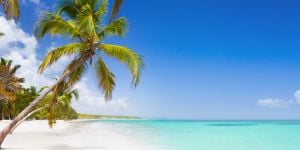A Large Percentage of Expats Don't Stay and Return Home
'Rocky M' and 'planner' highlighted in another thread, that apparently a large number of expats who relocate to the Dominican Republic don't stay beyond two years and return to their home country.
I've heard this too through English social media here.
It is not a subject discussed much but I wonder how true this is for all nationalities?
Here are a few of my thoughts on this subject:
1. I personally don't think this applies to all nationalities but I may be wrong. During my time travelling the country including living in Las Terrenas, I do sense that European nationals are more settled in their surroundings and have adapted to the localities and not introduced too much change and commercialism. Perhaps this is because in Europe many resort destinations tend to be small village communities by the sea and places like Las Terrenas, Las Galeras, Bayahibe and south of Barahona fit that mould and expectations.
2. North Americans and particularly American citizens have tended to congregate in a limited few resorts where a more commercialized and busy environment has grown. They tend to live in gated communities and in close contact. There is an attempt to recreate certain of the conditions they enjoy in their home country whilst enjoying the tropical climate. But it is not easy to get everything you expect.
3. In the English social media platforms found in DR there is a great deal of negativity being debated about living in DR. Everything seems to be a problem in life. It must rub off on newcomers. The sincere long term expats are drowned out with reasoned thinking. This is after all a developing nation with it's problems.
4. Are people relocating simply for the dream beach life without proper research and have opted for DR because of it's low cost and relatively easy residency access? Have they not considered the alternatives thoroughly because if DR fails then there won't be many options left?
It would be good to hear thoughts on this subject from our Italian, French and other foreign national members as well as Anglophiles.
Very interesting post. We are moving in September. We are selling everything here. That means no house to come back to if we decide not to stay. We plan on making the Dominican Republic our home but who can say what the future brings.
You're over-generalizing too much. Gringos are more varied than what you mentioned. We probably can never really know the actual stats on how many remain and how many leave, nor how many there currently are. The ones who leave seem to be mostly those who were naive about the place, didn't due their research, or test it out, and give up after a couple years. We see that all the time. It seems like the ones who stay longest, tend to be the richer ones, those who can afford private houses, guards and other servants, cars, the best hospitals, and can make frequent trips abroad. Same as every country.
I am repeating a statement that has been made in relation to the percetage that return over the years and as stated yesterday by two of our members and is known in the real estate business.
I personally think that the people that stay are those that have integrated into local life whether married or otherwise. They have made DR their home and feel at ease travelling the length and breadth of the country and have or would be happy to be a citizen here. Language of course is very important and an expat coming here must learn to communicate in Spanish to escape the trap of being restricted in their activities of life.
'cindyscruise', it is a great country and you must feel at ease here and work hard to integrate once here. Start Spanish lessons now if you are not conversant with the language.
My husband had done quite a bit of research prior to us starting our search. We visited many of the islands, rented short term and lived like locals. It was important for us to know what daily living looked like. We learned about milk that is sold on the shelf rather than the refrigerated section, brown outs, cable/internet that goes out from time to time and buying "ugly" fruit rather than the "pretty" fruit that is sold in stores in the US. and all the other quirks that come along with island living.
Perhaps it is our job to help educate others who are looking to make the transition to living in paradise.
I am happy that we took the path we did rather than staying at a resort and not experience the local culture before we made the decision to move here.
There are both pros and cons to living in the DR but that can be said of any place that you move even within the US.
'tracy.england', If I am correct you are living in Las Terrenas?
Having lived there, I can say the lifestyle is a world apart from Punta Cana or Sosua/Cabarete.
My intuition is that very few French, French Canadian or Italians find the place such that they return home after 2 years. The people who I met there were long timers. It is that type of resort where you live in a community and get to know the community and it is not commercialized. It is a warm little town (with the best beaches of course!).
I think you chose well if you are indeed there, as with others that choose LT.
According to statistics in most Expat websites, a majority of people intending to re-locate to the Dominican Republic and other countries return to their native land after a couple of years. From climate and culture shock to expat fatigue, there are many reasons we do not anticipate that change our views and feelings about the new promised land.
I would advise all newcomers to rent for a couple of years to confirm in your minds that this is the right choice. This is not North America or Europe and real estate is difficult to sell if you discover that you wish to return to your native land. Financial losses are not uncommon in an effort to get your money out and go back home.
Offering a different perspective...
We're still in process of obtaining our retirement residency. But we have entirely different objectives than long-term expats, it seems
We don't intend to move to DR and stay permanently.
Our intent is to be snowbirds, wintering over each year for 3-5 months. Perhaps that means we're not true expats.
We'll probably never buy a permanent residence in DR, which offers allws us to experience many region of the DR, over the years.
Our family ties are simply too strong to galivant off to the Carib permanently. There are birthdays to celebrate, baptisms and weddings to attend, school graduations to see and deaths to mourn in the company of loved ones.
I suspect many returned expats that intended a permanent migration, eventually find the pulls of family ties too strong. They miss their families more than they want the beaches, mountains or whatever.
Others may move, but only intend a few years of the DR adventure. Having already lived on a Florida beach for two years, we found the beach lifestyle pleasant but not addictive. No doubt others make the same discovery.
Finally, I'd guess that many returnees do so for medical reasons. A cancer diagnosis, for example, might cause expats to seek probably-superior medical treatment in their homelands.
To each their own, I think.
Jim
It's a complicated answer for sure. Are there cultures more likely to adapt? Yes. Less likely - yes.
I think we need to be careful of generalizing and stereotyping.
Jim,
I come and go to the DR several times a year and it probably added up to 3-4 months. I was going to apply for residency but was told by the DR Consulate in Miami that it probably would not be renewable because I would need a total of 6 months in country.
The statistics are there to be read in relation to which nationalities percentage wise live in DR as residents and anglophiles represent a smaller percentrage than what one may think reading English social media here. Equally the total number of expats residing in DR excluding Haitians is reasonably well definded through the census of 2010 and subsequent surveys of 2013 and 2017. We sometimes think we as Anglophiles are 'the expats' but we are actually very much in the minority in terms of all foreigners excluding Haitians.
What 'steverino7777' has posted very much confirms what we all have heard about a large pool of expats who buy property here have been doing.......not stay the course. It would be interesting if he can give us any indication of breakdown based upon nationality from his experience in the reaal estate business.
I do think it is easier for some Europeans whose language is of Romance origin (French and Italian) as well as the many resident expats from Central and South America to adapt to life here with Spanish language use.
And of course DR has a percentage of expats like Jim who live here only part time as well as a small percentage of single male and females who are here to enjoy another aspect of DR life and they perhaps are transient too.
The observation about the need for decent affordable medical care being a factor to return home is for sure valid.
This discussion apples to those who move here permanently, not snowbirds, not those who buy property to rent out etc. And not those with businesses who go back and forth.
I will have to look at statistics to see % where different groups are from. We know for sure the numbers are under reported.
Regardless, it's interesting to note that a good % don't stay long term
Using the posted DGM statistics of residency applications and renewals for the first 3 months of this year, the number of resident foreigners from English speaking countries is 18% of all nationalities, if we take out the reported Haitians in the total.
We often forget we Anglophiles represent a much smaller number of the expats living in DR, where as as tourist we still represent more than 50%.
If you're only going to stay a few months every year, snowbird, there is no reason to go thru all the hassle and expense of getting pr.
All those gringos who are in the real estate business(it seems like about half of them), love it when other gringos give up and go back. The same property can be sold an infinite number of times.....to other ones. We see that happen all the time.
planner wrote:We can't use just the stats of who is applying for residency as high numbers still don't apply.
Applying and renewing residency are what the DGM statistics give. New, one year renewals and four year renewals. About 32k annually and add in the numbers of every 4 year renewals, citizens, work , diplomatic and student visas and you get a good idea of the total.
And the total number of expats in DR is very well defined through the census and subsequent surveys of 2013 and 2017.
Residents, citizens and work permit holders probably account for 70% of all foreigners living here full time now, excluding Haitians.
The numbers are there using the statistics available to us.
As an example, how many Anglophiles from English speaking countries does one come across in daily transactions out on the street in the city of greater Santo Domingo where one third of the population lives? Furthermore how many in the country at large excluding resort areas. Fact is there aren't many and statistics prove it, so if you live in a tourist destination bubble with Anglophiles you think your presence is greater.
maybe because of all this info below peoples get back to their own country?
I'm dominican. I've been living in Italy for a year, but I travel frequently to my country. I address many truths trying to be as impartial as possible.
First, it is a country where if you receive money from abroad or you set up a business you can live as a rich being poor. With 3000 dollars or euros a couple can live comfortably in rd and ride a business or something. More profitable businesses: food, small hotels, etc.
Second. There are two classes of Dominicans, the "tigueres" and the decent ones. The decent Dominicans are workers, hospitable, respectful, friendly and of good habits. The tigueres are the opposite. Unfortunately, a large part of the population are tigueres. My personal calculation is that 70% of the population are tigueres and 30% of the population are decent.
Third. To live in rd you have to be very careful with tigueres. They can even kill you. If you are dressed well or you like to have your house clean and beautiful, they think you are rich because of that and that can be dangerous.
Fourth. Racism and prejudice are a reality in rd. There are deep prejudices against people of color, but there are prejudices against people with fair skin. There are also very marked prejudices against the rich ... And the poor. Many will say that is seen everywhere, but I lived 38 years of my life in rd, I know what I speak, and those sincere Dominicans who read this know very well that I am talking.
Fifth. Corruption is total. Present in all areas of daily life. I think it is because of the strongly rooted culture of tigueraje in many. You have to be careful because the indices of scams are very high in all levels and businesses. Rd is the third most corrupt country in the world, it will be something.
Quite right, but most gringos don't know it, or are in denial, in spite of all the horror stories they hear from others and in these groups.
The resident expat population is actually increasing and it is because it is one of the cheapeest, most diverse and interesting countries to take up residence despite the negativity some try to portray. My wife is Dominican and thinks more positively than the above poster's quote by another Dominican about her country whilst aware of all the difficulties.
Go to many other developing countries and especially Latin countries and you will find similar problems as posted above and that some expats can't live there and go back home. This happens the world over.
It is challenging for expats unfamiliar with living within different cultures to adapt to a country which is less developed in large part from where they come and where people communicate in a different language.
If it was all about the negatives where would we be living? I've travelled widely and lived abroad in developing countries and DR is to be ranked highly in my opinion with eyes wide open.
Expat.com has a Filipino site along with most other countries.
Go join and ask there and I am sure you will get better info than from a DR site.
Actually from what I read, the Phillipines has many of the problems you mention in relation to DR.
Philippines not too good for you since you said you are a dominicano. You have an advantage in the dr that you won't have in the phil. I used to live there, and know it quite well.
Yes, many of the same, and he will be at a disadvantage there compared to the dr, where he should know the ropes.
I think there are many reasons why people leave here.
In my experience, the biggest reason is an inability to adapt. Those who cannot adapt, will find it very very difficult and won't be happy.
legs208 wrote:Jim,
I come and go to the DR several times a year and it probably added up to 3-4 months. I was going to apply for residency but was told by the DR Consulate in Miami that it probably would not be renewable because I would need a total of 6 months in country.
Hi,
I strongly disagree with this information. We have to be extremely cautious with the information received and double check if it is accurate, in this case I am sure there is a misunderstanding.
I disagree in a large part of your words. Don't Italians, Americans, Canadians, Germans, etc have their own version of tigueres out there?
Don't we all face the inclemency of corruption of our government authorities?
Be kind with your words amigo mio, it is not fair to say such a large % of Dominicans are tigueres, many of us our really just waking up early everyday to work and make a decent living.
I was born in the States to Dominican parents and moved to the Dominican Republic at age of 5, that being said I hold a US passport, a US Driver's License and a Dominican cedula as a Dominican (not as resident) Went to law school in the Dominican Republic, did a MBA in the states and have worked with Immigrants affairs for the last 6 years, so far so good 100% of the people I know are decent people, not tigueres.
So yes, tigueres are everywhere my friend, let's be kind with the Dominican people, they deserve better.
The longer one stays in the US with increasing modern conveniences, the harder it becomes to transition to a place like DR with all of its issues.
US is becoming very expensive and changing. All places have the "pluses" and minuses"
legs208 wrote:Jim,
I come and go to the DR several times a year and it probably added up to 3-4 months. I was going to apply for residency but was told by the DR Consulate in Miami that it probably would not be renewable because I would need a total of 6 months in country.
Often, the rules are misquoted/misunderstood - even at the Embassies.
The residency rule...
you must not be ABSENT for 6 consecutive months...
Just come back - if they even enforce that rule.
Resetting the clock every 6 months keeps you Kosher
ExpatAffairs, I am not sure whose post you were responding to - was it #18? That poster is also Dominican.
We need to be careful of labels and using them! Not everyone is the same. There are good and bad everywhere.
The intent is NOT for this thread to go into the direction of debating this.
This thread is about noting that this country is not for all expats, take caution when selling everything and buying here UNTIL you know this is right for you. Many got caught by that. I know many who just did not want to be here and lost money because they jumped in too fast!
In relation to my opening post on this subject, I wonder, if and how the recent frenzy of negative reporting overseas and local social media hyper-reaction, has impacted/influenced those that live here or plan to relocate here as expats in relation the safety aspect of life here. And in so doing would make them think about returning home to live?
In my case I can say nothing has changed my mind much, rather like my country's foreign travel advice, (Hoy today wrote a story about and quote what the UK has been saying in their travel advice since January this year with minor tweakes this month as though it was all new) except to say that I am disappointed that a proficient well managed and policed hospitality industry receiving 6 million visitors annually has had it's image muddied by reporters and commentators that haven't enjoyed time in hotels here and travelling around a beautiful and fulfilling country and it's people.
Perhaps some focus and time on the ground in the nearby Puerto Rico or the USVI would be a wake up call for those that try to degrade DR.
Good journalism is being replaced by sensationalism to attract readers and advertising revenue.
Lennox, have to agree with everything you said above. To answer the question...no, none of the news has deterred my wife and I from relocating. I think being well informed, and having realistic expectations, is what matters. We still live in the States and I purposefully avoid this subject with family and friends. Why? Because they are quite ignorant about most other parts of the world, as most of the US population is. Some questions we get about the DR are ridiculous to say the least. Unfortunately most information comes from the daily news cycle, and you know how that goes.
Perhaps the keywords are as you write: 'having realistic expectations' before relocating here or indeed to any other country? And that is probably the main reason why a large number of expats don't stay the course.
Glad you plan having long term associations with this extraordinary country.
I am under no illusions that DR has it's challenges and unfortunately shootings in some of the barrios of the city do happen and current levels of delinquency do disturb the resident community here, but these are definitely not places where expats go with a few exceptions with local friends and should not deter anybody from a good life here in the tropics. Now if you were living in St Croix or St Thomas you would be passing through those parts of the island in your daily routines most likely. Why aren't the many shootings there coming with media health warning to visitors?
DR is a safe place compared to many other countries, especially the tourist zones, and has the same risk level as France as an example, but not everybody is willing to give Dominicans time of day in this regard.
I suspect that I am one of the smaller percentage of expats not living in tourist zones and gated communities and from my perspective today is no different to yesterday and the greater risk to my person remains a motor accident by far. But even that will not detract me from my chosen life here.
Motor vehicle accidents....now THAT is what I worry about :0|
RockyM wrote:Motor vehicle accidents....now THAT is what I worry about :0|
You will adapt and quickly if you are a good, alert, defensive driver.
I had training in the UK by motorway police for defensive driving to get lower insurance cover. it was good training for anticipating the unanticipated, which is exactly what is needed here.
The driving here should not be a reason to leave. It is equally challenging in many countries and slowly it is getting better and the quality of roads too are improving. If you move to Punta Cana everything is new.
They might have been poisoned from fondling all those filthy street dogs before going into the dining room and handling the food, and eating with their fingers. Grosses me out.
We are not going to engage in speculation about these "deaths". There is way way way too much of that going on already.
Posting FACTS as disseminated by the authorities is fine, open a thread for that. BUT, I will not allow speculation.
Make your relocation easier with the Dominican Republic expat guide

Education in the Dominican Republic
This article will cover the Dominican Republic's educational system, including public schools attended by 80% ...

Death in the Dominican Republic
What customs and procedures are common when dealing with death in the Dominican Republic? Find more about it in ...

Birth in the Dominican Republic
This article provides some information about the culture and the customs of Dominicans when giving birth and ...

Pregnancy in the Dominican Republic
Are you ready to expand your family in the Dominican Republic (DR)? This article should provide you with all the ...

Food and shopping in the Dominican Republic
It is well worth exploring the Dominican cuisine and shopping options, and note what they buy and where they shop, ...

The Dominican Republic lifestyle
Here is some useful information on the Dominican society and lifestyle that will guide you if you are planning to ...

The healthcare system in the Dominican Republic
If you are moving to the Dominican Republic, one of your primary concerns is likely to be the healthcare system ...

Living and accommodation on the South Coast of the Dominican Republic
Along the south coast of the Dominican Republic, going from East to West, you will find the sugar town of La ...
Forum topics on living in Dominican Republic



